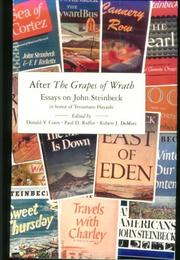Check nearby libraries
Buy this book

Traditionally, the critical reputation of Nobel Prize-winning American novelist John Steinbeck (1902-1968) has rested on his achievements of the 1930s, especially In Dubious Battle (1936), Of Mice and Men (1937), The Long Valley (1938), and, of course, The Grapes of Wrath (1939), one of the most powerful - and arguably one of the greatest - American novels of this century.
Book reviewers and academic critics often turned antagonistic toward Steinbeck when he no longer produced works with the sweeping reach and social consciousness of The Grapes of Wrath. He was accused of selling out, or co-opting his talent, when in fact the inordinate public success of Grapes and especially its attendant notoriety had caused a backlash for Steinbeck. As a result he became self-conscious about his own ability, and suspicious of that "clumsy vehicle," the novel.
The very act of researching and writing Grapes, which occupied him fully for several years and which he had already conceived as his final book on proletarian themes, changed him drastically.
Check nearby libraries
Buy this book

Previews available in: English
| Edition | Availability |
|---|---|
|
1
After the Grapes of Wrath: essays on John Steinbeck in honor of Tetsumaro Hayashi
1995, Ohio University Press
in English
0821411020 9780821411025
|
aaaa
|
Book Details
Edition Notes
Includes bibliographical references and index.
Classifications
The Physical Object
Edition Identifiers
Work Identifiers
Community Reviews (0)
History
- Created April 1, 2008
- 10 revisions
Wikipedia citation
×CloseCopy and paste this code into your Wikipedia page. Need help?
| July 16, 2024 | Edited by MARC Bot | import existing book |
| November 14, 2022 | Edited by ImportBot | import existing book |
| January 27, 2022 | Edited by ImportBot | import existing book |
| November 18, 2020 | Edited by MARC Bot | import existing book |
| April 1, 2008 | Created by an anonymous user | Imported from Scriblio MARC record |









